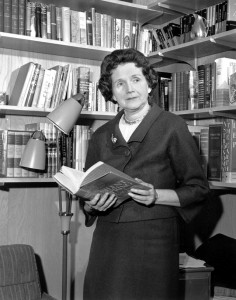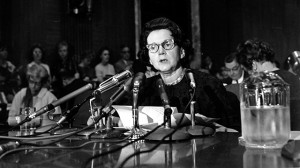
Holding her controversial book, Rachel Carson stands in her library in Silver Springs, Maryland, on March 14, 1963. (AP Photo)
“Rachel Carson’s book was the first big document to say, ‘Hey, wait a minute guys, there are effects or costs that are associated with this huge technology. Guess what, it’s affecting fish and birds and human beings,'” Suzuki says.
By taking on industry and government for their polluting ways, she became one of the founders of the environmental movement. “When Rachel Carson’s book came out, it was a turning point.” Suzuki says.
In her book, Carson made the case that if humanity poisoned nature, nature in turn, would strike back and poison humanity. While studies had existed on the effects of pesticides, no one had pored over the data and connected the dots the way Carson did for Silent Spring, which she spent four years researching. She wrote:
The most alarming of all man’s assaults upon the environment is the contamination of air, earth, rivers, and sea with dangerous and even lethal materials. This pollution is for the most part irrecoverable; the chain of evil it initiates not only in the world that must support life but in living tissues is for the most part irreversible. In this now universal contamination of the environment, chemicals are the sinister and little-recognized partners of radiation in changing the very nature of the world — the very nature of its life. — Rachel Carson
In Bill’s 2007 interview with the actress Kaiulani Lee, who portrays Rachel Carson in a play she wrote and performed throughout America, it is clear that Silent Spring was a book Carson never intended to write. Watch a clip:
Silent Spring was excerpted in The New Yorker before its 1962 publication. Furor over the book from the chemical industry came swiftly. Carson was accused of being a communist sympathizer and sexist statements dismissed her as a spinster who was “hysterical” and “over empathetic.” One major pesticide manufacturer threatened to sue her publisher, implying that she was some kind of agricultural propagandist working for the Soviet Union.
But that didn’t stop the Kennedy administration from ordering a study of the possible long-term effects of DDT and other pesticides, specifically citing Silent Spring as a catalyst. And a year after its publication, Carson herself testified before a Senate subcommittee on pesticides. She was 56 and dying from breast cancer, her body so weak that it was nearly impossible for her to walk to her seat before the panel.

Activist and author Rachel Carson, whose book Silent Spring led to a study of pesticides, testifies before a Senate Government Operations Subcommittee in Washington, DC, on June 4, 1963. (AP Photo)
The Environmental Protection Agency sees Carson as a founding inspiration; its official history site states: “There is no question…that Silent Spring prompted the Federal Government to take action against water and air pollution — as well as against the misuse of pesticides — several years before it otherwise might have moved.” Organizations like Greenpeace and Friends of the Earth trace their origins directly to Carson’s book.
When the book came out it flew off the shelves and Suzuki, who read it after spending eight years studying in the US, was eager to return home to Canada to be “this hot shot geneticist.” Reading the book changed his life.
Suzuki says Silent Spring taught him that what happens in a laboratory is not a good representation of what happens in the real world. “You can do all kinds of experiments in a test tube or in a growth chamber. But in the real world the wind blows, sun sets, night falls, it rains, all kinds of things happen that you don’t get in a controlled chamber.”
It also helped him to realize that in nature everything’s connected to everything else. “When we look at the world through science or even through the media, we isolate it and we look at little segments as if they’re not interconnected.”
Since everything in the world is connected, everything carries responsibilities, he says. “I wish that we could learn that,” Suzuki tells Moyers.
See Bill’s interviews with Kaiulani Lee and David Suzuki.

